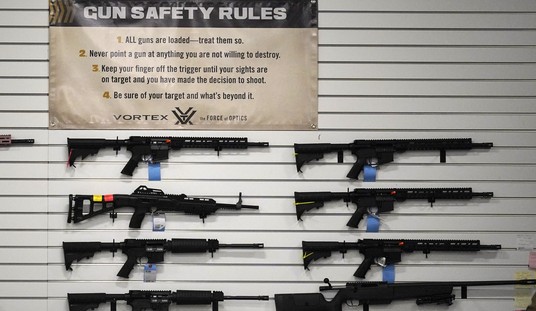Ohio Governor Mike DeWine’s generally been pretty good on Second Amendment issues, at least during his time as the state’s chief executive (his record in Congress, on the other hand, left a lot to be desired). After the mass shooting in Dayton last August, however, DeWine called for a change to Ohio’s gun laws. Legislators in the Republican-dominated statehouse have so far resisted the governor’s gun control push, but with violent crime on the rise in many Ohio cities, the Republican governor is once again pushing his STRONG Ohio bill in the name of public safety.
“Murders overall are up in Ohio,” he said. “The majority of victims are African American. We know from law enforcement that many of Ohio’s shootings are committed with handguns that are stolen or illegally obtained and used by convicted criminals who have no legal right to have them.”
“By our unofficial tally, we counted a total of 56 people shot across Ohio – 17 of them killed – from Friday, Aug. 14 through today,” DeWine said.
DeWine has diagnosed the problem, but his course of treatment isn’t going to be particularly effective. As the governor noted, criminals are using illegally obtained firearms in order to help facilitate their crimes. His STRONG Ohio bill, however, focuses an awful lot of attention on legal gun owners, though it does increase the sentence for using the gun in the commission of a violent crime. Unfortunately, the legislation also creates a “red flag”-style process to remove individuals firearms, and establishes a clunky and burdensome process for private gun sellers to ensure that buyers have passed a background check.
I believe the bill is well-intended, and I think that the folks who put the proposal together actually did listen to the concerns of gun owners and Second Amendment advocates. The problem is that Mike DeWine seemed to be looking for a gun control bill that gun owners could live with, and beyond the increased penalties for using a firearm in the commission of a violent crime, there’s just not much in the legislation that would actually help bring down the crime rate.
Let’s take a look at what’s happening in Cincinnati right now. Shootings are up 55% compared to 2019, and homicides could set a single-year record if they continue at their current pace. At least four people were killed and eighteen people were shot last weekend. Does Gov. DeWine really think that some sort of voluntary background check system for private sales of firearms is the answer to what’s happening on Cincinnati streets? The Inquirer newspaper recently spoke to some local officials and activists about the violence, and not one of them mentioned anything about the governor’s gun plan.
Gun violence this year in Cincinnati has had neighborhood leaders and officials concerned for months. About two weeks ago, [Assistant Police Chief Paul] Neudigate attributed the rise in violence to the novel coronavirus pandemic, which has prevented officers from being as much a part of the community as in years past.
The Rev. Ennis Tait, pastor of New Beginnings of the Living God in Avondale, said the shootings can end only with a collaborative approach in the city.
“More importantly, call this for what it really is, a public health crisis,” Tait said.”Black, white, rich, poor, urban, suburban, preachers, police and politicians. It’s going to take us working together to get to the root cause of this problem in our city.”
Tait said he’s bringing two initiatives to the city soon: “Positive Force Collaborative and Project Lifeline,” and that details would be released soon.
So far, officers have no suspects. Isaac said that while police work to identify shooters, the department will shift officers from other assignments to augment the number of uniformed officers in the affected neighborhoods.
Note that last bolded part. That’s a big reason why Cincinnati’s crime rate is spiraling upward. You’re telling me that with all those shootings, there isn’t one person that knows who fired at least a few of those rounds? Of course the code of the street is to not involve law enforcement in beefs, but there’s a good reason why many residents may be afraid to come forward; their own safety.
Cincinnati really is caught between a rock and a hard place right now. Shootings are increasing because criminals are feeling emboldened and less likely to get caught. In order for crime to come down, residents need to cooperate with police and provide their account and even testimony in a court of law. If they’re concerned for their own safety, they’re less likely to do so, which leads to more emboldened criminals terrorizing more of their own neighborhoods. In order to build that trust with the community, police need to be on the ground and actively engaging constructively with the residents they serve, but protesters and anti-police agitators want to make it impossible to do so, and may even go after any residents who dare to talk to the police as “collaborators.”
Mike DeWine’s STRONG Ohio plan does nothing to address what’s actually happening in to the good people in these bad neighborhoods. The issue isn’t even gun control, it’s self-control. Guns aren’t going off by themselves. Someone is pulling the trigger in every circumstance. In order to truly address violent crime in Cincinnati, Cleveland, Columbus, or Ohio cities that don’t begin with the letter “C”, you have to deal with the individuals who are committing these acts of violence. They have names. They’re real people, not philosophical constructs. The police generally know who they are, as do members of the community, but whenever they’re arrested they’re usually quickly back on the streets and are inevitably offered a plea bargain (if their case isn’t simply suspended) that amounts to a slap on the wrist and a few months behind bars.
Many of these young men do want a better and a safer life, and I believe that programs that help gang members escape the life and build a life of their own are incredibly important. So too, however, are real consequences for those who don’t take advantage of the opportunity to make better choices, which gets back to building the relationships necessary for police to do their jobs effectively.
Mike DeWine should decouple the proposals to increase sentences for using a gun in the commission of a crime from his other gun control proposals, and package them instead with measures to implement Project Ceasefire-style programs that combine resources for gang members who want to escape their current situation with greater prosecution, including referring cases to the Department of Justice, for those offenders who decide to stick with a life of crime. He should work with local mayors, activists, and (most importantly) police officers to develop strategies to build those relationships between law enforcement and the neighborhoods they serve. He needs to find a way to increase witness protection services at the local and state level to ensure that witnesses feel safe enough to testify, lessening the chances of a plea bargain and increasing the chances of a substantial sentence.
What Mike DeWine does not need to do, however, is pretend that gun control is going to make a difference here. In fact, government can only do so much. Ultimately its the hearts and minds of this small group of men that decide to grab a gun to settle a beef, to whip out their gun at the first perceived insult to their manhood or reputation, and to bang away at each other on the streets of their own neighborhood with no regard for the lives around them. This is almost always left out of the gun control debate because the solutions lie far outside of the reach of government, and deep within the souls of men.









Join the conversation as a VIP Member